When it comes to marketing, Search Engine Optimization (SEO) is one of the cornerstones of finding and retaining new users.
Unfortunately, however, the process is pretty time-consuming, which is why so many businesses struggle to keep up.
With so many elements to pay attention to at all times, a company can easily make SEO a full-time position.
Thankfully, technology can come to the rescue.
SEO automation tools can help your business maximize productivity and ensure that you’re getting the best bang for your buck.
So, let’s dive into the world of SEO automation and figure out how it works and how you can employ it for your next campaign.
- What is SEO Automation?
- Which Elements of SEO Can I Automate?
- The 8 Best SEO Automation Tools to Boost Efficiency
- Wrap Up: SEO Automation Tools Can Point You in the Right Direction
Download this post by entering your email below
What is SEO Automation?
As the name suggests, SEO automation is the process of taking repetitive or simple tasks and automating them.
Think of it as deploying a factory lineup in your SEO marketing.
The primary benefit of automating your SEO practices is that you can spend more time on the creative aspects of optimization.
Now that more time is freed up, you can focus your attention on tactics that yield the best results.
Which Elements of SEO Can I Automate?
While it would be amazing to have one tool that can take care of all your SEO needs, the fact is that you have to be strategic about which pieces you automate.
Also, automation doesn’t replace hands-on analysis and activity — it just streamlines your efforts.
If you think you can take a “set it and forget it” approach, you’re sadly mistaken.
The most common elements of SEO marketing that can get automated are:
Backlink analysis
One way that search engines verify which sites are the most reliable and authoritative is to see how many links point to them.
The more links to a site, the more valuable it is, so the higher it ranks.
Typically, the best way to get more links is to become an authority within your niche.
Backlink analysis allows you to see who is linking to your site. Ideally, only other reputable sources will link to you, as that will create a much better network.
If shady or spammy websites are connected to you, that can cause a penalty.
You also want to find out why those sites are pointing to you so that you can prevent others from doing so in the future.
Another way to utilize backlink analysis is to inspect competitor’s websites as well.
- How many backlinks do they have?
- Are they getting links from more reputable sources than you?
Knowing this information can provide valuable insight that will help you maximize your SEO strategy.
Rank tracking
As you know, the primary objective of SEO is to rank as highly as possible in searches.
However, when you have hundreds of pages on your site and you’re trying to rank for multiple keywords, it’s impossible to keep up.
Rank tracking tools allow you to see how each page ranks and how they improve (or get worse) over time.
Best of all, rank tracking can help you figure out which tactics are working and which ones aren’t.
Then, as you adjust your SEO strategy, you can see whether it’s improving your standing. If not, you can make adjustments sooner rather than later.
That said, keep in mind that it can take a while for adjustments to make any noticeable changes, and rankings can shift relatively quickly regardless of what you’re doing.
Site monitoring
Search engines want to provide the best results for their users.
So, sites with broken links, messy pages, or unsafe security protocols will not get featured on search results.
Site monitoring allows you to pay attention to all of your pages without running manual tests all the time.
If an automation tool does discover something wrong (i.e., slow page speeds), it will notify you so that you can fix it.
Competitor monitoring
While you’ll need to use all of these automation tools for your own SEO purposes, it helps to deploy them on competitor’s websites too.
This way, you can spot potential ways to outmaneuver them and rank higher in search results.
Keep in mind, though, that they can do the same on your site, so there is a bit of an arms race aspect.
Overall, as long as you focus on building high-quality content that users will value, you can often get the top spot (or stick within the top five).
The 8 Best SEO Automation Tools to Boost Efficiency
When choosing one of these tools, keep in mind that most of them focus on a specific task or element of SEO.
While some tools are more comprehensive, it’s best to know what you want to achieve beforehand.
Having goals in mind can ensure that you get the most productivity out of a single tool.
Just remember that automation is designed to help you perform tasks — not take over entirely.
If you’re hoping for a tool that can improve your rankings without your input, you’ll be sorely disappointed.
1. SEMrush
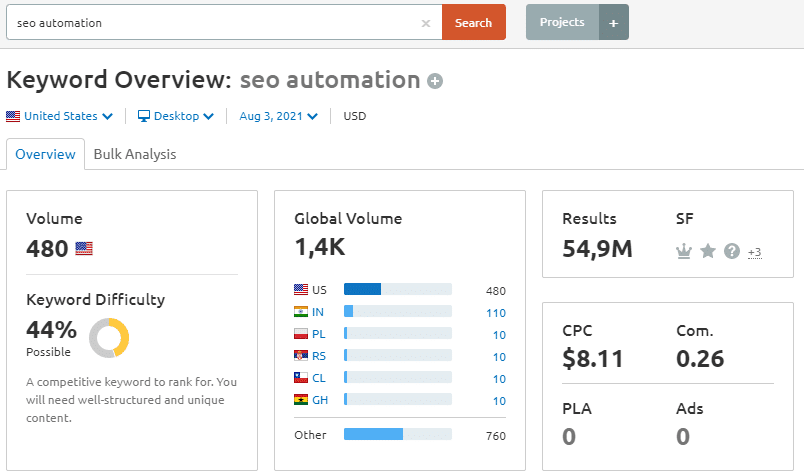
Kicking things off is this comprehensive SEO automation tool.
SEMrush is a multi-faceted marketing firm, but it offers some excellent programs to help you get more from search engine optimization.
Here’s a quick breakdown of what you can expect:
Keyword research
If you’re still coming up with keywords the old-fashioned way, you’re doing it wrong.
Sometimes, you may not realize which keywords and phrases will help you rank higher, meaning that you’ll struggle to keep up.
SEMrush breaks down this research into local and national levels.
So, if you’re a brick-and-mortar business, you can make sure you rank in local searches. If you’re an online company, you can rank anywhere.
Backlink analysis
You can look at your own website and those of your competitors.
Again, backlinks are crucial in establishing authority, which is valuable for search engines.
Technical SEO audits
Are you using your tags correctly?
Have you updated all of your site tags, from images to alt text to meta descriptions?
If not, you could hurt your ranking. SEMrush can analyze every page of your site to spot any potential issues.
This tool is beneficial when building new pages or updating current ones so that you don’t miss anything.
SERP tracking
As we mentioned, rank tracking is vital because it can help you determine which tactics work best.
SEMrush can see how your pages rank against all your different keywords daily.
From there, you can see changes and connect them to specific strategies. Over time, you can refine your process until you reach the top spot.
2. Google Search Console

Since Google is the number one search engine, any tools that it offers are pretty valuable.
Although Google is always tight-lipped about its algorithms and updates, it provides excellent analytics and automation tools.
All you have to do to get started is submit your sitemap for indexing. If you’re already using Google Analytics, you’re already done.
Google Search Console will show you how your pages rank for various keywords and illustrate which keywords bring the most traffic.
This insight can be highly valuable because the keywords you want to rank for may differ from those associated with your site.
Google will also alert you automatically if something is wrong.
These issues can be broken links, missing tags, or inconsistent information. Once you’ve corrected the problems, you can notify Google so that it updates its sitemap accordingly.
When getting started, you will want to utilize the URL inspection tool.
This tool looks at a specific page and provides in-depth details about it based on the last web crawl.
This data can help you optimize each page more efficiently since you don’t have to guess what’s wrong.
3. Screaming Frog SEO Spider
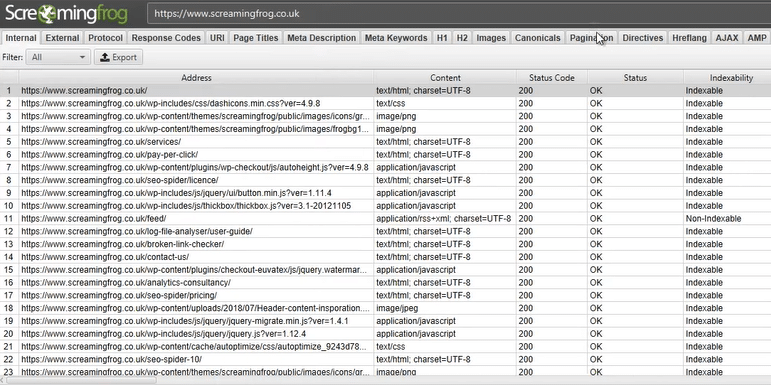
Next, we have another comprehensive marketing firm that offers a free SEO automation tool.
It is called the SEO Spider Tool, and it works very similarly to a Google web crawler.
This tool will analyze any page on your site and provide detailed data about what works and what doesn’t.
Fortunately, SEO Spider Tool is free to use for up to 500 pages. If you need more than that, you’ll have to upgrade to a paid version.
Depending on the size of your site, the free option may work just fine.
With the Spider Tool, you can analyze:
Broken links
One or two links are pretty easy to fix, but if there are dozens, you can export a complete list to make it easier to source the correct URLs.
Sitemap generation
If you need a sitemap for Google, you can generate one with this tool.
Integrate with analytics tools
SEO Spider can work with Google Analytics, Page Speed Insights, and more. Integration ensures that you can work more efficiently at fixing any errors.
Analyze meta data
This tool will notify you if a tag is too long, too short, or missing vital keywords.
Each report includes many more details, which can seem overwhelming at first. However, more data is often better since it can help you get a clearer picture of what’s really going on.
Ahrefs
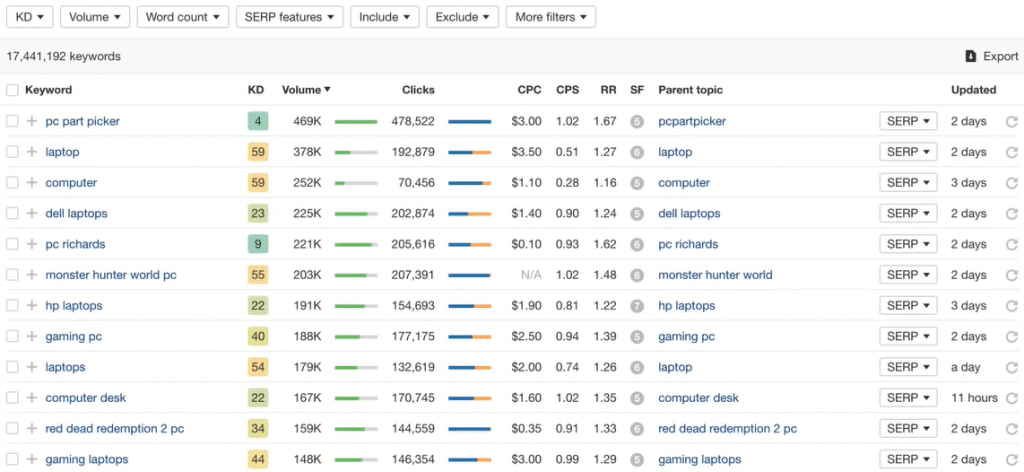
If you’re looking for an all-in-one tool, Ahrefs is about as close as you’re going to get.
While this program isn’t free, you can test it out for seven days to make sure that you know what it can do.
There are five automation tools provided with this system, including:
Site audit
Discover problems within all pages on your website.
Ahrefs will ping the standard errors, including broken links, missing tags, and more.
Site Explorer
See what your competitors are doing and what issues they may have.
This analysis can help you figure out whether your site should rank higher or lower for specific keywords.
From there, you can develop a more productive SEO strategy.
Keywords explorer
Keyword research should be an ongoing process since user tastes can change over time.
Also, as search engines adjust and upgrade their algorithms, you may have to focus on different keywords.
Ahrefs’ Explorer tool shows you which words people are searching for the most and how closely they relate to your content.
Content explorer
As we mentioned, the best way to become an authority is to produce high-quality and informative content.
You’ll never rank highly if your pages are empty or devoid of meaningless information.
The Content Explorer tool will showcase the top page material within your industry. Then, you can determine what you need to do to produce similar content on your site.
Rank tracker
Finally, you can see how your pages rank for each keyword and how those rankings change over time.
SentiOne
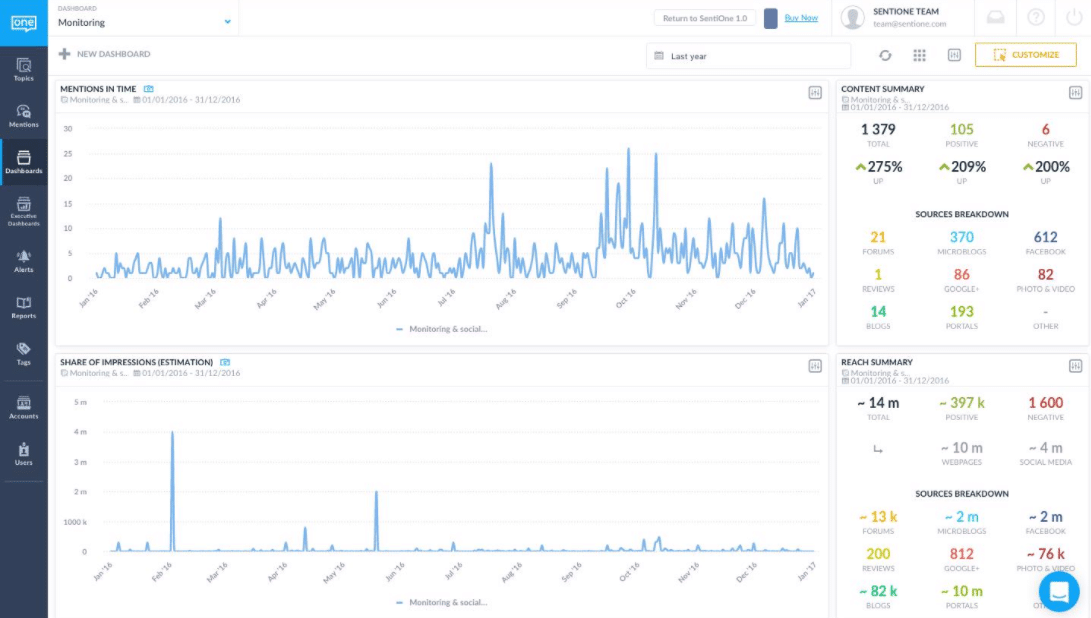
The name of this automation tool refers to the fact that it uses machine learning to deliver valuable insights.
SentiOne isn’t technically an SEO tool, but it can still help with optimization, although in a roundabout way.
Site traffic is a big indicator of whether your pages are relevant to a specific keyword. So, the more traffic you get, the higher you’ll rank in SERPs.
One way to build that traffic is via social media platforms.
SentiOne “listens” to chatter on social sites and notifies you when users mention your brand.
From there, you can determine whether to reach out and sell to those people with relevant content.
For SEO purposes, it’s best to share posts or page links so that users will go directly to your website.
However, you can use SentiOne for direct sales opportunities.
Overall, this tool is mainly designed for social media marketing, but it can yield some tangible SEO benefits as well.
Plus, because it uses Artificial Intelligence, it will adapt and learn as you go, making it more efficient and productive.
AnswerThePublic
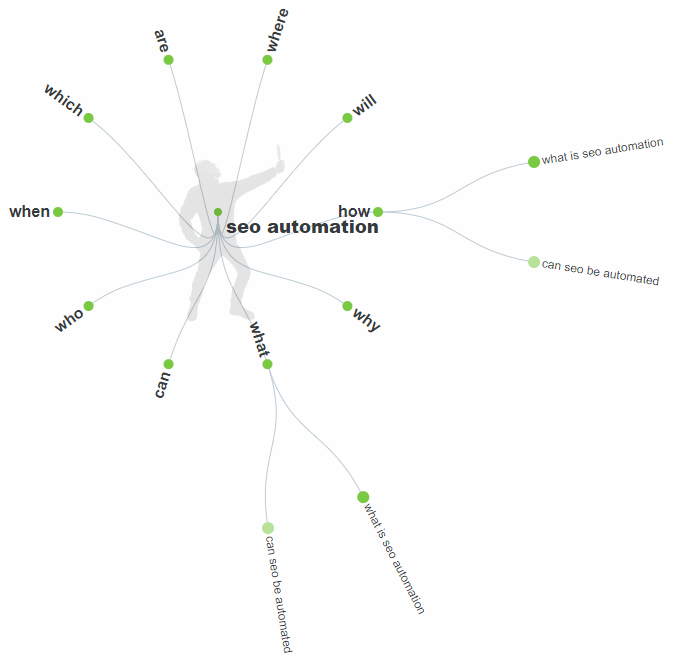
Since keyword research is such a fundamental part of SEO marketing, you need all the help you can get.
AnswerThePublic is a free tool that allows you to see relevant searches and keywords related to the most important ones for your brand.
Best of all, you only have to use one or two words to get tons of information.
This process allows you to start with your industry and then dive deeper into specific topics.
AnswerThePublic breaks down your query into five unique sections:
Questions
What are people asking about your product or industry?
Prepositions
How are users narrowing down their search to more refined products or services? For example, if you search for “baby toys”, a preposition could be “baby toys with suction base”.
Comparisons
How does this keyword relate to others? Are they connected or disparate?
Alphabetical
Search queries are broken down by letter so that you can see what users are searching for the most.
Related
How is your keyword bundled into other searches, such as “[product] near me” or “[product] at Wal-Mart”.
As you can imagine, this data helps you get into the mindset of your audience, which ensures that you can optimize for the right keywords and phrases.
SE Ranking
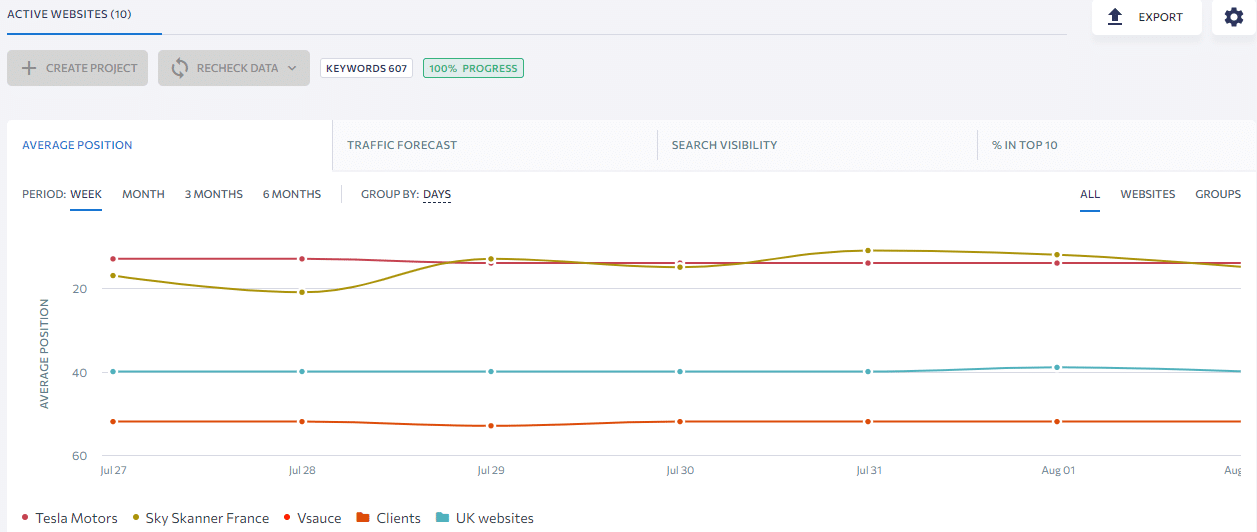
Like Ahrefs or SEMrush, this tool is another all-in-one option.
So, if you want to avoid silos and keep all of your SEO strategies in one place, this might be an excellent choice.
Here is a quick rundown of all the various automations you can use:
Rank tracking
This tool is the primary function of SE ranking, and you can get as granular as you like. You can pay attention to local searches, including cities and counties.
Competitive research
Learn which keywords your competitors are ranking for the most and which pay-per-click ads they’re running.
Website audit
Discover any potential issues that could cause your ranking to go down.
Backlink monitoring
Verify the links on your own site or a competitor’s web page. Monitoring allows you to get change notifications on the fly.
On-page checker
See how well a page is optimized for a specific keyword.
Marketing plan
Organize your strategies into a cohesive plan.
Keyword research
SE Ranking looks at billions of keywords to see which ones are the most valuable for your business.
Morphio
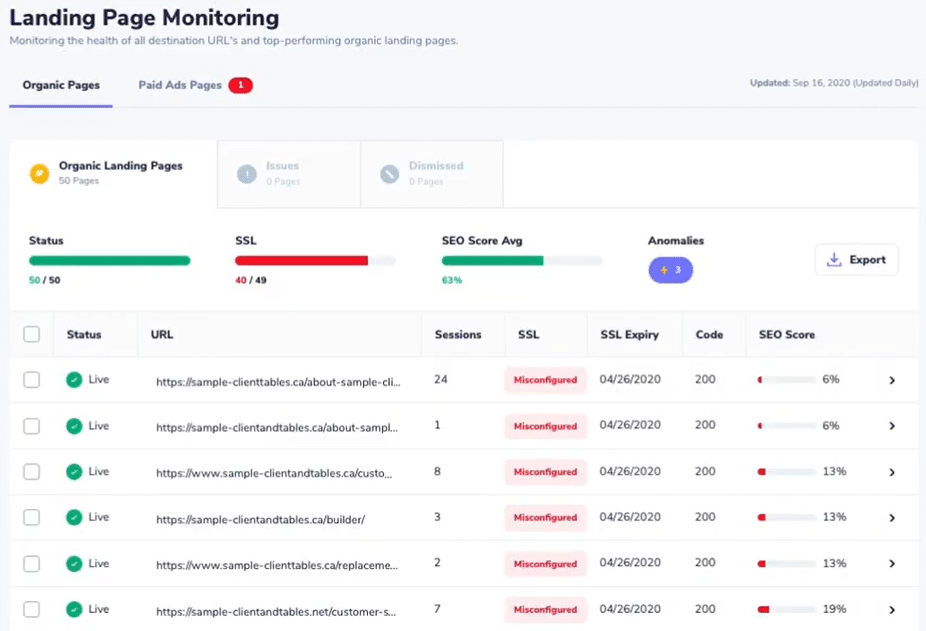
Here we have another tool that uses machine learning to help you improve your SEO strategy.
Morphio not only analyzes your website but will also create a plan of action to capitalize on the tactics that are already working.
Best of all, it integrates with most marketing platforms, including Google Analytics, Google Ads, Facebook Ads, Slack, and more.
Overall, instead of trying to digest your SEO data and figure out what to do with it, Morphio will provide insightful opportunities to get more from each campaign.
It also delivers many of the same automation tools like auditing, backlink monitoring, and more.
Enhancing SEO Automation with WriterAccess AI Features
In SEO automation, WriterAccess stands out with its innovative AI-powered features designed to streamline content creation and optimization processes.
The platform offers a range of tools that leverage artificial intelligence to assist in generating content ideas, conducting keyword research, and drafting initial content pieces.
These AI functionalities not only save time but also ensure that the content aligns with your SEO strategy, enhancing its effectiveness.
One of the latest additions to WriterAccess’s suite of services is the WriterAccess Humanizer. This unique feature combines the efficiency of AI-generated content with the expertise of skilled freelancers.
The Humanizer service allows for the quick production of content through AI, which is then refined and optimized for SEO by professional freelancers. This ensures that the content maintains a human touch, resonating with your audience while adhering to SEO best practices.
By leveraging the AI capabilities of WriterAccess, businesses can enhance their SEO efforts, achieving better results in a more efficient and effective manner. The platform’s commitment to innovation and its integration of AI features make it a valuable tool for anyone looking to automate and improve their SEO processes.
Wrap Up: SEO Automation Tools Can Point You in the Right Direction
That’s a fact.
But you need to know how to use SEO automation tools in a clear and effective way that makes the most sense to your business.
Fortunately, Rock Content can assess your current needs and develop a comprehensive strategy to help you improve.
Since SEO marketing is so valuable, you can’t afford to miss out.
So don’t waste any more time and check how mature is your SEO strategy!









